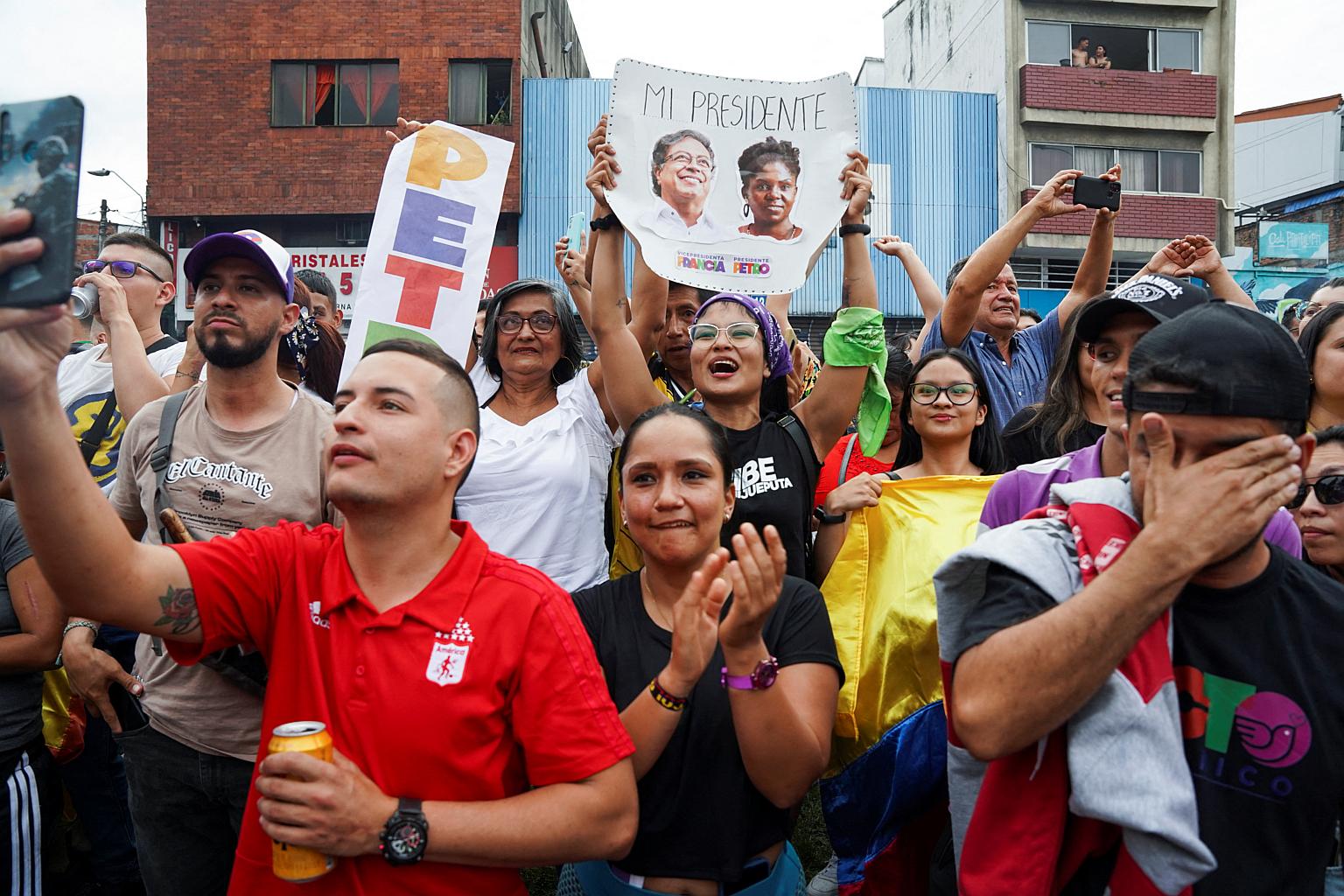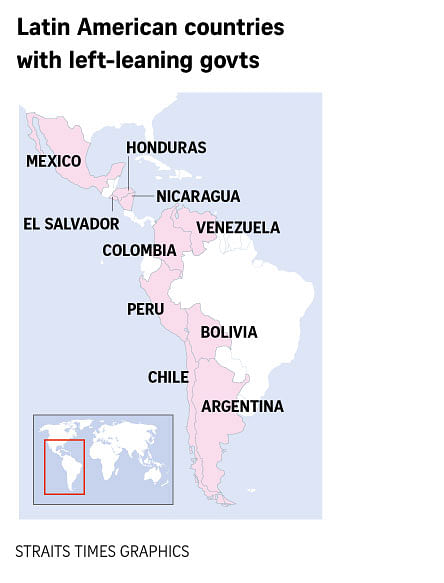Latin America's new 'pink tide' gains pace
Sign up now: Get ST's newsletters delivered to your inbox

Supporters celebrate after leftist Gustavo Petro won the presidential election, in Cali, Colombia, on June 19, 2022.
PHOTO: REUTERS
MEXICO CITY - The political pendulum in Latin America (Latam) has swung further left after Colombia's recent elections, with about half of the countries in the region having leftist governments.
This has raised questions about possible impact on free trade agreements (FTAs) - like the one Singapore has with some Latam countries - foreign investment and international relations, among other areas.
The shift to the left, known as the "pink tide", has been driven by discontent with poor economic conditions such as inflation and increasing social inequality. This was exacerbated by mismanagement of the Covid-19 pandemic and the resulting economic fallout, as well as inflation fanned by Russia's invasion of Ukraine.
Left-leaning parties have won elections in 10 out of 21 countries in Latin America since 1998: Colombia; Chile; Nicaragua; Honduras; Peru; Bolivia; Argentina; El Salvador; Mexico; and Venezuela.
Brazil, the region's economic giant, is expected to follow suit in elections in October.
The pink tide is "mostly due to the inability of previous governments to provide tangible results for most of the population," Mexico's former ambassador to China Sergio Ley Lopez told The Straits Times.
"The (new) leaders... have exploited this inability and made it part of their campaign to deliver what people have been expecting," said Mr Lopez, president of the Asia-Pacific unit of the Mexican Business Council for Foreign Trade, Investment and Technology.
The leftist governments have promised to improve the standards of living of vulnerable groups through ways such as raising minimum wages and welfare spending. In reality, however, not all are leftist and there are more differences than similarities among them.
Mr Lopez said "there are moderate and intelligent left governments like the one we see in Chile, which... is progressive".
Chilean President Gabriel Boric seeks to promote broad social reforms that are blocked by the current Constitution, a legacy of General Augusto Pinochet's 17-year dictatorship. A referendum will be held on Sept 4 on a draft new Constitution.
Other leftist governments appear to be more populist and their promises remain purely rhetoric.
One example is the Mexican government led by President Andres Manuel Lopez Obrador.

Ms Magdalena Carral, co-director of communications consultancy Carral Sierra and Asociados, told ST that the government has reduced public spending on health and education, despite the pandemic, and is focusing on austerity and achieving a primary surplus.
"Although the president wants to be seen as a leftist and has taken on a strong discourse in that direction, his actions tell a different story," said Ms Carral, who is a founding member of the Mexican Council of International Affairs.
She also noted that the current global climate "could be a time of opportunity in Mexico because of phenomena such as nearshoring". Due to supply chain disruptions, trade fights between the United States and China, and the war in Ukraine, firms are looking to relocate to nearby countries.
But "many companies are still hesitant to move to Mexico because some conditions are still uncertain".
For example, the opposition to renewables such as wind and solar has given pause to international companies with environmental, social and governance mandates.
Some past cases, such as the cancellation of a brewery project of Constellation Brands that was midway in construction, have also dampened investors' interest, she added.
In a referendum in 2020, residents in Mexicali city voted against the completion of the US$1.4 billion (S$1.9 billion) brewery on the grounds that its intensive water consumption was bad for the community.
There have been some concerns about how the pink tide could affect FTAs with Mexico and other Latam nations.
Mexico has an FTA with the US and Canada, and another one with Singapore as part of the Pacific Alliance that also includes Chile, Colombia and Peru.
Singapore is also working towards the signing and ratification of an FTA with the Mercosur trade bloc comprising Argentina, Brazil, Paraguay and Uruguay.
Mr Arturo Alessandri-Cohn, honorary consul-general of Singapore in Chile, said leftist governments tend to create entities that "make a lot of noise" but which are short-lived, such as the Union of South American Nations. The only Latin American economic integration scheme that has worked so far is the Pacific Alliance .
He is confident that there will not be any obstacle to the FTA between Singapore and the bloc.
Formed in 2011, the bloc has a gross domestic product of over US$1.9 trillion and is collectively the world's eighth-largest economy.
Mr Lopez said more important to investors are a country's policies, not ideological colours.
"If these regimes that are coming to power implement actions to reject foreign investment, the capital will not come. But if the regimes, regardless of their ideological colour, welcome foreign investment... it will continue to come," he added.


